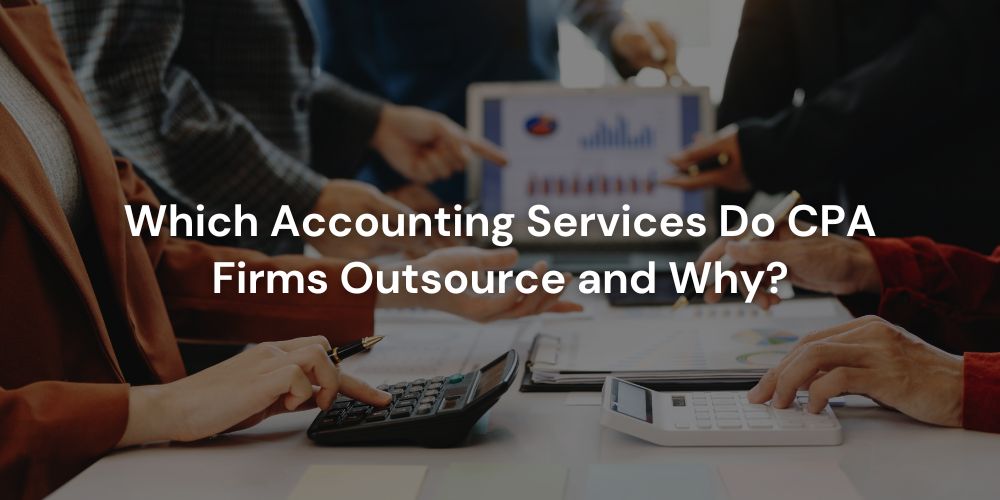Which Accounting Tasks Do CPA Firms Outsource and Why?


In today’s rapidly evolving business landscape, Certified Public Accountant (CPA) firms are not just about crunching numbers or preparing tax returns. They are comprehensive service providers catering to myriad financial needs, from advisory to auditing. However, as the scope of their services expands, so does the complexity of their operations. Many CPA firms are outsourcing to streamline their processes, reduce overheads, and maintain a competitive edge. But what accounting tasks are they outsourcing, and why? Let’s delve deeper.
What Accounting Tasks Do CPA Firms Usually Outsource?
1. Tax Preparation
Tax preparation involves collating financial data, understanding the latest tax laws, and filing tax returns for individuals and businesses.
Why They Outsource: Tax seasons are notoriously hectic. The influx of clients needing their taxes prepared and filed can be overwhelming. Outsourcing tax preparation helps manage this surge in workload without hiring additional permanent staff. Moreover, external experts can bring a fresh perspective and are often well-versed with the latest tax codes and regulations, ensuring accuracy and compliance.
2. Bookkeeping
Bookkeeping is the day-to-day recording of financial transactions, including purchases, sales, receipts, and payments.
Why They Outsource: While essential, bookkeeping is routine and time-consuming. By outsourcing bookkeeping, CPA firms can focus on more strategic and higher-margin services, such as financial planning or advisory. It also ensures that the mundane bookkeeping task is handled efficiently without errors.
Read more: The Cost of Outsourced Bookkeeping Services for Your CPA Firm
3. Payroll Processing
Payroll processing encompasses calculating employee wages, deducting taxes and other withholdings, and ensuring timely payments.
Why They Outsource: Payroll, with its regularity and the need for precision, can be a complex beast, especially considering the myriad of regulations and potential for errors. Outsourcing payroll service ensures that employees are paid correctly and on time and all regulatory requirements are met.
4. Data Entry
A routine task involving inputting financial data into digital formats or software.
Why They Outsource: Data entry, while simple, is time-consuming. Outsourcing this task ensures that data is inputted accurately and efficiently, freeing up the in-house team for more strategic tasks.
5. Audit Support
This involves reviewing financial statements to ensure accuracy and compliance with accounting standards and regulations.
Why They Outsource: The audit process is multifaceted, and parts, especially the initial data gathering and preliminary analysis, can be outsourced to expedite the process. This allows the in-house team to concentrate on critical areas that require in-depth expertise.
6. Financial Analysis and Reporting
This involves analyzing financial data to provide insights into a company’s performance and creating detailed financial reports.
Why They Outsource: Creating in-depth financial reports requires specialized knowledge and can be labour-intensive. Outsourcing offers access to experts who can provide insights using the latest tools and methodologies, ensuring stakeholders get a clear and accurate picture of the company’s financial health.
7. IT Services and Support
This includes maintaining and updating software, ensuring cybersecurity, and providing tech support.
Why They Outsource: With the increasing reliance on technology, having robust IT support is crucial. However, maintaining an in-house IT team can be expensive. Outsourcing provides CPA firms access to the latest technology and expertise without the overheads of a full-time team.
8. Customer Support
Handling client queries, providing support, and ensuring client satisfaction.
Why They Outsource: Client queries can become overwhelming during peak seasons. Outsourced customer support ensures timely and efficient responses, enhancing client satisfaction.
Why do CPA Firms Choose Outsourced Accounting Tasks?
Outsourcing accounting tasks has become a strategic tool for many CPA firms to achieve these objectives. Here are the primary reasons why CPA firms choose to outsource:
- Cost Savings: Outsourcing can be more cost-effective than maintaining in-house teams, especially for tasks that aren’t core to the firm’s operations.
- Flexibility: CPA firms can scale their operations up or down based on demand without the challenges of hiring or laying off staff.
- Access to Expertise: Outsourcing can provide access to specialists and expertise that might not be available or affordable in-house.
- Focus on Core Activities: Outsourcing routine or specialized tasks allows the firm to focus on its core competencies and value-added services.
- Technology: Outsourcing providers often have the latest technology and tools, eliminating the need for the CPA firm to invest in them.
However, while outsourcing accounting services offers numerous benefits, CPA firms must ensure that the providers they choose maintain the highest quality, confidentiality, and security standards.
How To Choose The Best Outsourcing Accounting Providers For CPA Firms
Choosing the right outsourcing accounting provider is crucial for CPA firms. The right partner can enhance efficiency, reduce costs, and deliver high-quality service. Conversely, a poor choice can lead to inefficiencies, increased costs, and potential reputational damage. Here’s a step-by-step guide to help CPA firms select the best outsourcing accounting providers:
1. Define Your Needs:
- Determine which services you want to outsource: bookkeeping, tax preparation, audit support, etc.
- Understand the volume of work and the frequency at which it needs to be done.
- Identify any specific software or tools you want the provider to use.
2. Research Potential Providers:
- Start with referrals from industry peers or associations.
- Conduct online searches and read reviews.
- Consider providers that specialize in services for CPA firms.
3. Check Qualifications and Expertise:
- Ensure the provider has qualified accountants familiar with the accounting standards and regulations relevant to your clients.
- Check if they have experience serving your size and your niche CPA firms.
4. Evaluate Technology and Infrastructure:
- The provider should use up-to-date accounting software and tools.
- Ensure they have robust cybersecurity measures in place to protect client data.
- Check if they offer cloud-based solutions for easy access and collaboration.
5. Assess Communication Skills:
- Effective communication is crucial. Ensure the provider is responsive and can communicate clearly.
- Consider time zone differences and how they might affect communication and turnaround times.
6. Ask About Data Security and Confidentiality:
- The provider should have stringent data security protocols.
- Ensure they are compliant with relevant data protection regulations.
- Ask about their confidentiality agreements and whether they will sign a non-disclosure agreement.
7. Request Client References:
- Speak to current or past clients of the provider to get insights into their reliability, quality of work, and responsiveness.
8. Consider Pricing and Contract Terms:
- Understand the pricing structure: Is it per hour, per task, or a monthly retainer?
- Ensure there are no hidden costs.
- Review contract terms, including the scope of work, turnaround times, and termination clauses.
9. Conduct a Trial Run:
- Before fully committing, consider giving the provider a small project or task. This will help you gauge their efficiency, quality of work, and communication skills.
10. Review and Feedback Mechanism:
- Ensure there’s a system in place for regular reviews and feedback.
- This will help in maintaining quality and addressing any issues promptly.
In Conclusion
Outsourcing accounting tasks are not just a cost-saving measure for CPA firms. It’s a strategic decision that allows them to stay agile, access specialized expertise, and focus on their core competencies. As the business environment becomes more complex, the ability to delegate specific tasks to trusted partners can be the difference between thriving and merely surviving. However, while the benefits are clear, CPA firms must choose their outsourcing partners with care, ensuring quality, confidentiality, and security at all times.
Consider Bestarion for Outsourcing Finance and Accounting Services
Our tailored outsourced accounting services can enhance your firm’s capabilities and provide your clients with exceptional accounting solutions. You need to scale your firm, improve profitability, and focus on the work you want to do. Bestarion will take care of all your accounting tasks.
Bestarion is an ISO 27001-certified company, IRS security 6, and GDPR. We invest in robust security systems and applications, provide adequate security training to employees and ensure that our client’s data is always protected.
Getting started is 100% risk-free.
Your satisfaction is our priority, so we offer a free trial for the first three books. Let’s experience excellence with our risk-free bookkeeping service and judge our quality for yourself. Contact us today to experience high-quality accounting solutions.
Read more: How Accounting Outsourcing To Viet Nam Benefits USA Accounting Firms?

